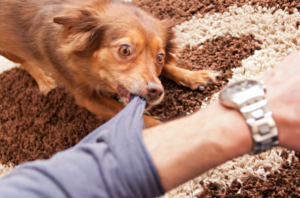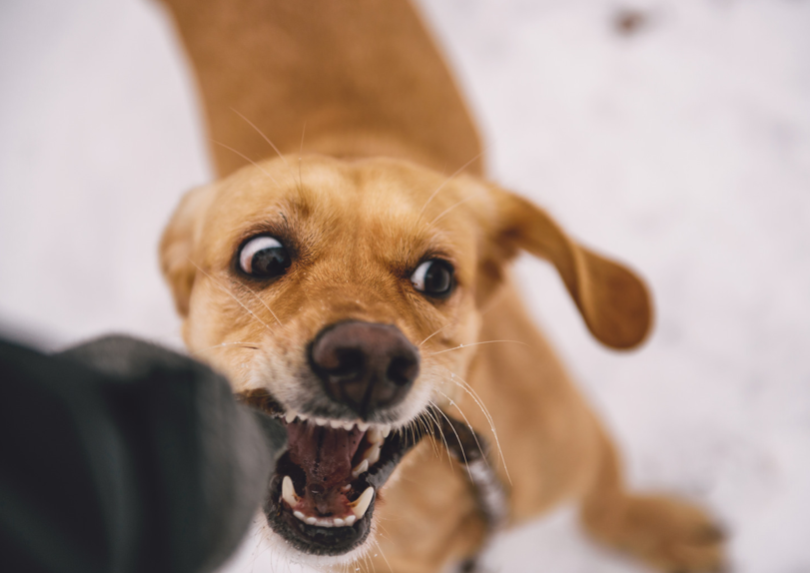It’s instinctively human to not want to think that our furry friends could ever do us harm, but the truth is that any dog has the potential to bite. When strangers meet your dog for the first time, one of the first questions they usually ask is whether or not your pet bites. And if your answer is no, it’s probably because your dog enjoys meeting new people and generally good-natured around them. In this guide we will review the best ways on how to get your dog to stop biting.
Although it’s commonly believed that only aggressive dogs bite, the truth is that any dog can bite given the right circumstances.
The person is likely wondering if your dog will bite them if they try to pet it. If your dog enjoys the company of people, then the answer is most likely no.
However, it’s essential to have conversations about your pup’s limits and what makes them comfortable. Also, be candid about their personality traits honestly. Every dog reacts differently when feeling overwhelmed or threatened– some may resort to biting while others wouldn’t think twice about it.
By knowing why dogs typically bite, we can work on preventing such instances from happening altogether.
The Reasons Dogs Bite and How to Prevent It

Dog bites might seem to come without warning, but this is almost never the case. Dogs will give several signs that they are feeling uncomfortable or threatened before resorting to biting, ranging from small nicks that don’t break the skin, all the way up to serious bites requiring medical treatment. Often times, people simplymiss these warning signsthat a bite could be forthcoming. Check out Miami Valley Dog Training.
Dogs typically communicate their discomfort before biting by barking, growling, or snapping. But what are the primary causes of dog bites? Dogs might use their teeth to communicate for various reasons:
Fear
Most canine aggression is, fundamentally, a fear response. A dog may be anxious about something or someone encroaching on their personal space. When the object of their fear gets too close, dogs can become overwhelmed and “over threshold,” leading to biting. For a dog biting out of fear, it is typically an attempt to create distance from whatever or whoever they are afraid of.
Scared
Dogs can sometimes bite when they are startled awake, especially if they have been sleeping soundly. The dog may be confused and disoriented, not recognizing their surroundings or the people around them. This can happen with any age of dog, but is more common in older dogs who might already have diminished vision and/or hearing. Always take care when waking a sleeping dog, and teach children to never try to crawl into bed with a dog or wake up a dozing pooch.
Protection
Dogs bite for a variety of reasons, one being resource guarding. This is when they feel the need to protect something valuable from being taken away, like their food or toys. If your dog expresses fear through biting in these situations, it may be due to past experiences where they felt those things were threatened.
Some dogs may have aggressive tendencies and might bite if they feel like their home is being invaded or if they think someone in their family is in danger, regardless of whether that danger is real.
Frustration
Dogs can get overwhelmed and, as a result, may start biting. Their frustration might come from being in an uncomfortable or unpleasant situation that they feel trapped in. Sometimes dogs are frustrated because they want to reach something but are restrained by their owner or leash. This is called redirecting or a redirected bite; in other words, the dog turns and bites whoever’s holding them back.
Dog is in Pain
Dogs can become anxious, afraid, and even aggressive when they experience pain or are injured. If your dog is hurt, be cautious of handling them as they may lash out from the fear/pain. Also, if your pet’s behavior changes abruptly, you should make an appointment with both your veterinarian and a certified positive reinforcement trainer in your area.
Playing
A type of biting that is often overlooked is mouthing or light biting that happens during play. This is a way for dogs to explore their environment and is perfectly normal behavior.
Though we may not like it, mouthing during play is natural for dogs. If you’re worried about how much your dog mouths while playing with you or other dogs, consider meeting with a trainer to get a better understanding of whether your dog’s play style is appropriate.
How to Set Your Pup Up for Success
Dogs are like people in that they all have different personalities, so what may not bother one dog could completely freak out another. Because of this, it’s key for owners to be aware of their dog’s emotions and act based on what they see. If you notice your pup getting tense or agitated, take them away from the scene immediately to avoid any lashing out.
If, for example, your dog is skittish around other people or dogs, you should avoid submerging them in social situations. It’s okay if not every dog enjoys being the life of the party–you can learn more about what stresses your dog out by working with a trainer. With sufficient instruction, you will be able to manage future encounters within your pet’s comfort level so that they eventually become apathetic instead of anxious when they see other animals or humans.
To Prevent Flooding/Overwhelming
The goal is to prevent your dog from feeling “flooded” with stressful situations. Flooding refers to exposing your dog to lengthy or substantial amounts of things that scare or overwhelm them. It’s an approach that generally makes dogs anxious and does nothing good to change how they feel about the overwhelming situation. If a dog is overwhelmed, it’s more likely for them biting as a response.
Dogs are constantly changing and their behaviour will shift depending on how stressed they are, if they’re tired, as they age or how unknown a situation might be. If, for example, you have a dog who is used to being home alone and you then throw them a birthday party with loads of people suddenly coming into the house – that could easily overwhelm them.
Don’t Punish Your Dog
Dogs growl and snap as a way of telling us that they’re not comfortable or are feeling overwhelmed. While it’s easy to want to punish this behavior, doing so will only make the problem worse.
If you punish your dog for growling to express their discomfort, you’re more likely to cause a dog bite in the future. This is because they learn that it’s better not to warn at all (by growling or snapping), and may therefore resort straight to biting when feeling uneasy.
Getting Professional Help
If you’re unsure of what is or isn’t normal dog behavior, it’s always a good idea to consult with an experienced trainer who specializes in positive reinforcement. For example, if your dog has started lunging and growling or seems anxious in different situations, it may be time to seek out professional help.
A positive reinforcement trainer will not only help you understand your dog’s behavior, but also how to position them for success and steer clear of events that may be too much for them. This might include creating a safe space away from people or activities, or keeping your dog on a leash. With the help of your trainer, your dog can learn new associations with scary, stressful, or overwhelming situations so they don’t feel resorting to biting is their only option.











